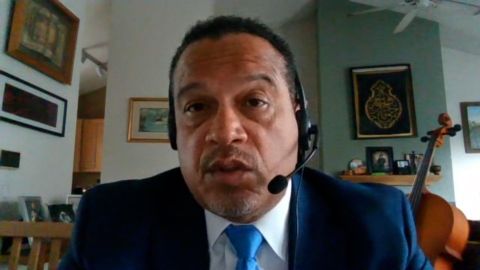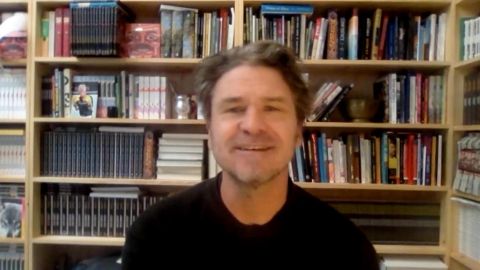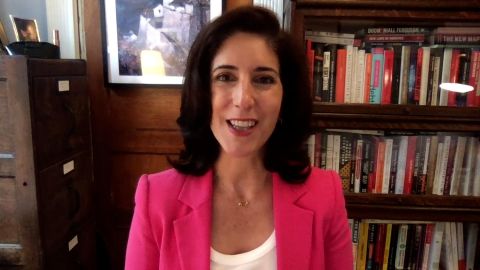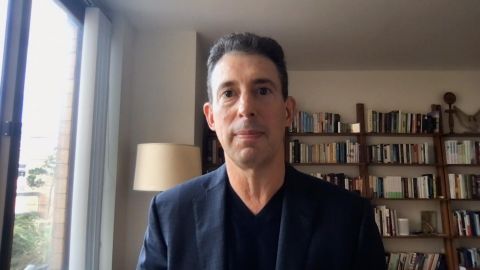Read Transcript EXPAND
BIANNA GOLODRYGA: Well, now, it’s been a troubling week for Facebook, raising questions about social responsibility in the age of social media and big tech. Someone who writes extensively about the perils of corporate power is award-winning and bestselling author, Dave Eggers. And he’s out with a gripping sequel to his best-seller, “The Circle.” “The Every.” Imagines and Amazon, Facebook type company that becomes the richest and most dangerous monopoly ever known. Here he is talking to our Walter Isaacson.
(BEGIN VIDEO CLIP)
WALTER ISAACSON: Dave Eggers, welcome to the show.
DAVE EGGERS, AUTHOR, “THE EVERY”: Thank you. Good to see you, Walter.
ISAACSON: You know, you’re the most interesting novelist of our time and I think it’s partly because you have this light observational touch but you go into really profound moral issues. It sort of reminds me Walker Perso (ph) using great sort of subtle humor to diagnose the ills of our time. And the pathology you take on, both in “The Circle,” your last novel, and now, in “The Every” is social media, the digital revolution. Why have you made that your focus?
EGGERS: Well, I’ve been in San Francisco since ’92. So, the internet and the digital culture kind of came up around me, I guess, in all the time I’ve been here and I’ve seen it go from this kind of utopian, almost communitarian culture that was very idealistic and almost had a hippie vibe to it, to something that’s much different. That we’re seen the rise of the surveillance capitalism, we’ve seen the aggregation of power. It’s sort of beyond anything that anyone could imagine. And now, we see sort of a rupture of democracy and the idea of truth that’s all been sort of made possible through these platforms that are treated, they’re unregulated, they’re not treated by publishers, they’ve allowed to disseminate lies with impunity and without consequence. So, I’m concerned about how it’s changing us as a people and how it impacts our democracy.
ISAACSON: Do you think that’s cooked into the business model of Facebook and Amazon, which are the two companies that are sort of at the core of your book?
EGGERS: Well, I think the profit motive, when you give this — these are companies doing what they have to do to, you know, grow market share, to increase their stock price, they’re obligated to grow, and the only way to grow is to become more — you know, to acquire more users, to acquire more power. It’s the nature of the beast. And unregulated, they will be themselves. Our only choice is regulation from the outside to sort of keep their power in check, to use anti-trust law, as it should be used to call a monopoly a monopoly and break them up when necessary for the greater good of society.
ISAACSON: One of the unnerving things in your novel, “The Circle,” before this and even more so on this one, “The Every,” is that people sort of get coopted. They tend to go along after a while. So, many of the characters become collaborationists. Do you think that’s an instinct that we all have to fight?
EGGERS: Yes. You know, I’ve been here 30 years. I’ve seen — I’m always shocked at when another force or another non-profit or another good person sort of gets coopted by this digital culture and without question. You know, whether or not it’s seeing or hearing, like, a very beloved friend says, like me on Facebook, or, you know, the saddest words in the English language, or whether it’s — you know, when an author saying, buy my book on Amazon, instead of saying, support your local independent bookstore. You know, offering. We’re always given choices between feeding the apex predator and asserting or fighting for more diverse economy. But we continue to feed this apex predator with a handful of them. And that’s what’s been surprising to me this last 10 to 20 years is that we’re, by nature, I think, idiosyncratic and rebellious people. I mean, Americans were supposed to be this way and yet, we continue to acquiesce and be submissive to these handful of companies and their motives. And so, I’m always interested in complicity and how we — all the power these companies have is really power that we’ve given them. And why is it? Why do we do this? Is it because anything that provides a semblance of certainty and safety, we will accept? So, that’s why we have surveillance in every part of our lives and we’re photographed hundreds of times a week in urban environments because it gives us this semblance of safety. So, is there any limit to that? And I really wonder if there is a red line that could be crossed if people will say, OK, that’s too much. That’s too far. And the book posits that maybe there is a line that’s — that we’ll hold to. I don’t know. But it was interesting and sort of fun to explore it.
ISAACSON: You talk about how we succumb to the Amazons and the Facebooks because of their convenience and don’t push back. You’ve pushed back, which means your book is now not available, the hard hardback book on Amazon. Explain to me, explain to our viewers, how do you get your book now?
EGGERS: You know, there’s a couple thousand independent bookstores in this country and they’ve struggled mightily in these last 20 years, especially in these last 10 or so with Amazon’s market share ticking up every year, but they fight on. And, you know, we have a little publishing company called McSweeney that published the book and there’s five of us who work here. I’m here in our offices right now. And we wouldn’t exist without the independent bookstores. We would never have got a chance if we were — if we only had one monopoly to work with. And so, we’re trying to invite people to go back to their independent bookstore and if they haven’t visited it in a while, then maybe they can throw some business to their local book sellers. And so, it was a hassle to do. It’s been incredibly hard to keep the book off of Amazon because their tentacles are everywhere. But this is one maybe small little thing we can to do to drive a little bit of business back to the industry.
ISAACSON: How has your view changed since you wrote “The Circle,” which was mainly about a Facebook like entity, now, there’s an even bigger conglomeration than the “The Every”?
EGGERS: Well, In “The Every,” there’s a merge with the world’s largest e- commerce site. So, they not only have control over sort of screen life, they have boots on the ground. They have ships and trucks and planes and they’re controlling most of what’s bought and sold in the country, and, you know, that creates incredible convenience for people, as we’ve seen during the pandemic. Amazon’s market share and power increased dramatically because people value that, you know, having things delivered to their door when it wasn’t safe to go to stores. And so, I fear that we’re heading toward more aggregation of power and mergers like this in the real world and I also fear how complicit we are sometimes in giving these companies more power because we value safety, because we value convenience and because we want simplicity of everything being in one place or through one portal. But again, that only empowers these very few monopolies to control what we experience, what we have access to, that can create incredible barriers to entry and what should be ostensibly open marketplace. And I think that even in the publishing industry with every increased percentage of the book, you know, sales that Amazon has, we get more control given to a company that isn’t necessarily a book company. They are an e-commerce company, just as interested in selling dishwashers and exercise machines as they are books. Amazon has gotten this power by using predatory pricing. You know, selling books under cost, at a loss in order to drive out competition. It should be anti-trust law 101 should applied here, and yet, regulators have given them a pass from the beginning. And now, we are at a point where we might face an existential threat from the publishing industry. So, we have power. The government has power. We know what needs to be done. We just need to act on it to make sure that we have economic diversity, I guess. Retail diversity. That we still have main streets and store fronts and independent bookstores and small businesses that can survive and that we don’t continue to feed one company, one apex predator that eliminates all competition.
ISAACSON: But as you point out in your book, it’s about what people want. People are making choices to do this. And I think, there’s a — I’m going to quote a line from your book and ask you to unpack it for me but it’s somebody working at this big company. “The Every,” you said, it’s about order. People think the world is out of control and they want someone to stop the changes. This aligns perfectly with what “The Every” is doing, feeding the urge to control.
EGGERS: Yes. Yes, I mean, in the end, there is something called the sum num, which is a three-digit number, one to a thousand that summarizes your value as a human. And it’s based on everything from grade school marks to parking tickets to credit score to social media participation to whether or not you’ve ever dropped a piece of garbage on the street. Things like that. It’s all in one thing and it gives people that sense of certainty. Am I good? And what number can I apply to myself? And I feel like we do have increasingly a hunger to apply numbers to everything, you know, whether it’s films, whether it’s books, it’s going to be poetry and dance next or visual art, anything that can be given that false sense of — you know, that reductive sense of value that a number can apply we’re going to do. And I think we have more and more discomfort with nuance and with mystery and like who knows, and more comfort with give me the number, give me the number, give it to me straight, and ideally, eliminate any human subjectivity. How do we take away all the fallibility of human judgments and replace them with algorithm certainty or the perception of algorithmic certainty? So, I keep seeing people desperately wanting to replace that fallibility, whether it’s like in baseball with umpires. People don’t want umpires anymore. We’ve got to have a robot that tells us whether it was a ball or a strike and we’re not comfort with the fallibility. And I think it’s going to increasingly take over so many unexpected elements of society that are going to be replaced by, you know, A.I., by algorithms, by that sort of sense of certainty that we expect now and more and more that we demand.
ISAACSON: You also tend to believe that more choices are better and that we’re surrendering choices. I want to give you the pushback that one of the characters in your own book says, which is, we’ve had three generations now for whom the greatest stress in their lives is choice. And I’m convinced that people don’t really want it. It’s they don’t want all these choices. Think of mustard. And do you think that maybe this is all happening because we’re too inundated with free choice?
EGGERS: Yes. One of this — maybe the earliest catalysts for this book was talking to friend of mine who is a clinical psychologist at a major university in the southeast. And she said, the kids were coming in day one as freshmen already overwhelmed. There were too many choices in their lives. Too much expected of them. Too much information. Too many exchanges that they had to do. Thousands of exchanges and choices before they even started their schoolwork on a given day. And so, they would come already overwhelmed on the first day school. And so, between that and the fact that increasingly we’re aware of the impacts of our choices, you know, if we buy a product that’s, you know, unethically sourced or we eat salmon that has an adverse effect on the oceans, whatever it is, we want somebody to tell us what that right choice is. And so, a monopoly like “The Every” steps in and says, don’t worry about it. We’ll take care of it for you. We’ll make sure that your choices are the right choices. And we’ll also keep you within your preferences, if you stay within your preferences, things would be cheaper, thins would more efficient, the system as a whole will run better. And if you step outside of that, there will be punishments via preference compliance, which is sort of the stick to the carrot of some of the one’s preferences. But I think we are heading in this direction where we’re going to realize that unlimited choice does have an environmental impact. And “The Every” does aggregate more power by putting themselves up as the only force that can effectively combat climate change because it’s going to take a benevolent monopoly, they claim, to turn back the catastrophic effects of climate change. We need a global command economy run by them in order to affect radical and quick change to save the planet.
ISAACSON: And let me in with a really big philosophical question, one that’s at the heart of your work and which we perhaps don’t question enough because it seems so obvious to us, which is, let me just ask you, why is privacy a good thing?
EGGERS: Well, without privacy, I don’t think we have a democracy. I don’t think we have a safe space for descent, we don’t have a safe space to think. Contemplatively to create. There’s a thread in “The Every” where they — the whole company hasn’t had a new idea in a decade because there are no vestiges of privacy. Nobody has a place to turn off, to explore, to sort of think radically, to think an anarchically even, which I think is essential to creativity. Creativity comes from an anarchistic place of the mind. You have to have a place where you can not worry about what someone’s going to say or think about some bad idea or some idea and development or how do we improve our democracy? How do we fight against monopoly? All of these things require a private space. But the more we give it up, the more we give ourselves into tyranny, autocracy. And we make it impossible to fight back. So, privacy is the beginning of what makes us human, really, otherwise, we’re cogs in a machine. I think that if we — and every time we lose a little bit of it, we become a little bit less human. And so, we need to fight it tooth and claw, and I think it’s going to be trench warfare for the next decade to make sure we have a little bit of privacy left.
ISAACSON: Dave Eggers, wow, thank you, thank you so much.
EGGERS: Thank you so much, Walter.




